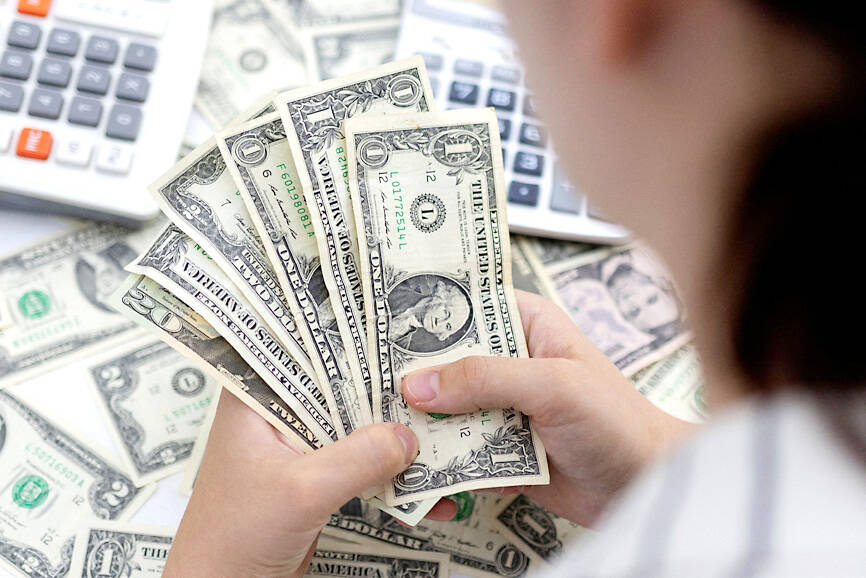A massive transfer of wealth is gaining speed, as billionaires are increasingly padding their vast fortunes with inheritance rather than entrepreneurship, a study by Swiss banking giant UBS Group AG showed yesterday.
Over recent decades, the number of billionaires has ballooned, with surging entrepreneurial activity within tech and other areas ushering fresh members into the super-wealthy club.
However, in its ninth annual report on the world’s billionaires, UBS noted a significant shift in the way such fortunes are being made and expanded.

Photo: Reuters
“The heirs to billionaires are gaining prominence,” UBS Global Wealth Management head of strategic clients Benjamin Cavalli said in the foreword to the report.
“This year’s report found that the majority of billionaires that accumulated wealth last year did so through inheritance as opposed to entrepreneurship,” he said in a statement.
“This is a theme we expect to see more of over the next 20 years, as more than 1,000 billionaires pass an estimated US$5.2 trillion to their children,” he said.
That forecast was based on the estimated accumulated wealth of today’s billionaires who are over the age of 70, UBS said.
“After the surge in entrepreneurial activity witnessed over the past few decades, many business founders are now aging and passing their wealth to the next generation,” the study said.
The study showed 2,544 billionaires in the world by April this year, with their ranks swelling by 7 percent in the preceding year.
After seeing their combined fortunes shrink the previous year, billionaire wealth grew by 9 percent from April last year to April this year to US$12 trillion, it found.
The new billionaires included 53 heirs, whose accumulated inheritance amounted to US$150.8 billion, exceeding the US$140.7 billion joint fortunes of the 84 new self-made billionaires on the list, it said.
UBS attributed this shift in part to a subdued market for initial public offerings through last year and into this year, limiting the opportunities for entrepreneurs to monetize the values of their businesses.

SEMICONDUCTORS: The German laser and plasma generator company will expand its local services as its specialized offerings support Taiwan’s semiconductor industries Trumpf SE + Co KG, a global leader in supplying laser technology and plasma generators used in chip production, is expanding its investments in Taiwan in an effort to deeply integrate into the global semiconductor supply chain in the pursuit of growth. The company, headquartered in Ditzingen, Germany, has invested significantly in a newly inaugurated regional technical center for plasma generators in Taoyuan, its latest expansion in Taiwan after being engaged in various industries for more than 25 years. The center, the first of its kind Trumpf built outside Germany, aims to serve customers from Taiwan, Japan, Southeast Asia and South Korea,

Gasoline and diesel prices at domestic fuel stations are to fall NT$0.2 per liter this week, down for a second consecutive week, CPC Corp, Taiwan (台灣中油) and Formosa Petrochemical Corp (台塑石化) announced yesterday. Effective today, gasoline prices at CPC and Formosa stations are to drop to NT$26.4, NT$27.9 and NT$29.9 per liter for 92, 95 and 98-octane unleaded gasoline respectively, the companies said in separate statements. The price of premium diesel is to fall to NT$24.8 per liter at CPC stations and NT$24.6 at Formosa pumps, they said. The price adjustments came even as international crude oil prices rose last week, as traders

SIZE MATTERS: TSMC started phasing out 8-inch wafer production last year, while Samsung is more aggressively retiring 8-inch capacity, TrendForce said Chipmakers are expected to raise prices of 8-inch wafers by up to 20 percent this year on concern over supply constraints as major contract chipmakers Taiwan Semiconductor Manufacturing Co (TSMC, 台積電) and Samsung Electronics Co gradually retire less advanced wafer capacity, TrendForce Corp (集邦科技) said yesterday. It is the first significant across-the-board price hike since a global semiconductor correction in 2023, the Taipei-based market researcher said in a report. Global 8-inch wafer capacity slid 0.3 percent year-on-year last year, although 8-inch wafer prices still hovered at relatively stable levels throughout the year, TrendForce said. The downward trend is expected to continue this year,

Taiwan Semiconductor Manufacturing Co (TSMC, 台積電), which supplies advanced chips to Nvidia Corp and Apple Inc, yesterday reported NT$1.046 trillion (US$33.1 billion) in revenue for last quarter, driven by constantly strong demand for artificial intelligence (AI) chips, falling in the upper end of its forecast. Based on TSMC’s financial guidance, revenue would expand about 22 percent sequentially to the range from US$32.2 billion to US$33.4 billion during the final quarter of 2024, it told investors in October last year. Last year in total, revenue jumped 31.61 percent to NT$3.81 trillion, compared with NT$2.89 trillion generated in the year before, according to